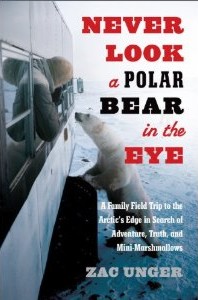 Never Look a Polar Bear in the Eye
Never Look a Polar Bear in the Eye
Jan 29, 2013
Hardcover
Da Capo Press
ISBN: 9780306821165
ISBN-10: 0306821168
“You didn’t hear it from me, but there’s going to be a bear lift tomorrow,” one of the helicopter pilots said in a low, conspiratorial voice. It had been a bad season for them; fog and whiteouts had kept them grounded and unpaid for days on end. I’d gotten used to running into them at the bars and restaurants as they wandered around in stir crazy agony, desperate to get in the sky again. But the upcoming bear lift was big news, not to mention a closely guarded secret.
The bear lifts (or “bear drops,” depending on who you talk to) are the ultimate tool in the Polar Bear Alert’s arsenal. The truly incorrigible bears, the repeat offenders, and the animals that have been languishing in jail for thirty days or more are tranquilized, put into a net, slung beneath a helicopter and physically removed from the community. Before helicopters were easily available in Churchill, bears were removed with fixed-wing aircraft, but that limited the final destination to preexisting landing strips. Because most of those strips were to the south, the bears would shake off the narcotics and march right back into town, often arriving less than a day after their deportation. Now bears are flown thirty miles to the north, which is the direction their natural migration would be taking them. Nonetheless, some bears still manage to find their way back.
Bear lifts are kept quiet because they have a way of turning into carnivals. Given the possibility for mayhem in the combination of helicopter travel and (mostly) unconscious bears, the wildlife officers like to keep the scene quiet. But inevitably, word leaks and by the time the chopper is ready to go, there’s usually a cheering section several hundred strong.
Helicopter travel is expensive, even for the government, so in an attempt to defray the cost, the wildlife officers often introduce the biggest variable of all: television cameras. Film crews that agree to pay for the cost of the flight are given exclusive access to the bear drop, including behind-the-ropes VIP access, interviews with conservation officers and scientists, and—the biggest prize of all—the chance to ride along in a helicopter and film the release of a groggy bear into the wild.
“It’s that British crew,” the pilot told me, rubbing his hands together. “Or maybe it’s the Germans. It’s the one with the really cute little producer. Natalie, I think.” I thanked the pilot and promised I wouldn’t tell anybody. Seeing a narcotized bear dangling in a net was the hottest ticket in town, and I had to get myself out there. I knew Robert Buchanan and PBI had to be central to any plan like this, and hadn’t he always said that he’d do anything he could to help me out?
I called up Krista, Buchanan’s assistant and all-around savior. Buchanan might have been the visionary, but I had to wonder whether he’d be able to get coffee in the morning without Krista’s guidance.
“So what time are we heading out there tomorrow?” I asked when she answered the phone.
“Out where?”
“To the bear lift!”
“I didn’t know you were coming along for that,” she said, her voice darkening.
“I wouldn’t miss it,” I bluffed. “It’s totally fine for me to come along.”
“All right then.” And before she could change her mind, I made her give me the details.
The next morning, I piled into Krista’s truck alongside a couple of low-level functionaries from the World Wildlife Fund. The weather was cold and crisp, perfect for flying. The film crew—British, as it turned out—was getting set up. And, as promised, Natalie the producer was indeed quite cute; she also appeared to be in a foul mood. Dressed in designer jeans and a thin coat, she was smoking a cigarette and cursing the weather, which, hovering just around freezing, felt positively balmy compared to the past few weeks of storms. Shaun Bobier, the Manitoba Conservation officer, told her where her crew could stand and where she could set up her cameras. Every time he turned away, she edged closer to the front door of the jail, only to have him order her back into place. Complicating the scene was a Korean film crew scuttling about, as well as a group of Germans with big video cameras and matching wilderness-chic Jack Wolfskin parkas, which, like Natalie’s outfit, were fashionable but almost completely useless.
Waiting for the action to begin, Natalie danced in a circle and blew against her hands. She wasn’t someone who did well with downtime. “Bears, bears, bears. Hassle, that,” she said. Turning to one of her crew members she asked, “What’ve you got next? Gorillas, is it? Brilliant. Sharks and then gorillas and then whales, that’s the bloody life.”
From what I understood, Natalie had cut a deal with the Germans to share some footage. But the Koreans absolutely had to go. “I’ve paid too bloody much for this whole thing to have them come in and steal my shots,” she said. She complained to Shaun, who, with a pained expression, sent the offending film crew behind a distant rope. He also reminded Natalie that one of her guys was getting a little close to the door. Natalie wrinkled her nose and pouted; big-money television types don’t like to be told what to do by midlevel game wardens in khaki pants. In turn, babysitting pushy moviemakers had to be the worst part of Shaun’s job. If only he had tiny tranquilizer darts just for them…
“And you’re who?” Natalie asked, noticing me for the first time.
“I’m with PBI,” I said, which was my best shot at getting to stay. It had the added virtue of being almost true. I wiggled my notebook at her. “I’m just a writer. No camera.” She gave me a hard look as I tried to melt into the crowd of the legitimate Polar Bears International people.
As predicted, a crowd had assembled behind the rope. A few tour buses, a handful of vans, and close to a hundred people craning their necks to get the best view. They stood a hundred yards off, a solid wall of fleece. There had to be $1 million worth of Patagonia gear in that crowd.
When the specks of two approaching helicopters appeared on the horizon, Natalie’s stress level ramped up still further. “I need you gone now,” she barked at the Koreans, who were pretending not to speak English and hoping they might be forgotten. But in the face of her wrath, they packed up and moved dutifully behind the rope line. I stuck as close to Robert Buchanan as possible.
After the helicopters landed, there was a flurry of logistics as people shuffled from one camera angle to another. A large cargo net was laid on the ground, and the pilot rechecked his rigging. Nothing would be worse than to go aloft and lose your bear midflight. On camera. You’d make every newscast on earth.
At last everything was ready. The British were in place, the Koreans were in exile, and I was still on the inside of the rope. This prison door opened and out rolled a quad with a small flatbed trailer hitched to the back. The crowd exhaled in unison.
“Oh, that’s horrible,” said a woman standing next to me. She covered her mouth with her hand. “I think I’m going to be sick.”
An enormous bear was stretched out on the trailer. He lay on his stomach, paws splayed out and head wobbling from side to side as the vehicle bumped over the dirt. He might as well have been dead. An uneven green mark stained the hump of his spine, like an alien blood spot. It was meant to warn Native hunters away from eating this bear’s tranquilizer-poisoned meat. I’d seen resting bears before, but this was different. He looked defenseless and naked, more like a pig on a spit than a sleeping bear. He was meek and flabby, without muscle tone, and worse, without any awareness of the world around him. I had thought that he would be quiet like a child. Instead, he was as comatose as a drunk. He was hard to look at.
The mood of the crowd was gladiatorial, simultaneously aghast and enthralled. Everything was done as professionally as possible, but still it felt as though the bear were being paraded before us, a tease for the commoners in the cheap seats and so close that those of us in the royalty section could almost smell his wet flesh. I wanted him to raise his head or struggle a little; anything to show he wasn’t dead. Death might have been better than this absence of spirit. Churchill was a model of polar bear best-management practices; these were the most highly experienced rangers and scientists on earth. So why did watching this process make me feel so dirty?
The wildlife officers maneuvered the bear off the trailer and into the net. He was as toneless as pudding, and the men heaved and grunted to wedge him into position. The net was tied in place around him, the pilot made his final checks, and the helicopter lifted off. There was a moment when the cord pulled taut, but the bear had yet to leave the earth; a radical departure was underway. I looked away, not wanting to see the bear smashed into the tightening sutures of his net. When I looked back, the helicopter was chopping away northward, the bear hanging below like a fat teardrop.
“That’s brilliant,” Natalie said, squinting hard at the disappearing bear. “Absolutely bloody brilliant.” Natalie had stayed behind while her film crew boarded a chase helicopter and took off to capture the bear’s release into the wild. As the sound of the blades died out, she turned to me and said, “If any of them put photos of me on Facebook with no mascara and looking like the Michelin Man in all these clothes, I swear they’re absolutely dead.”
At a restaurant later that night, I found myself seated near Natalie and her crew. I couldn’t help but overhear their conversation. They were planning to rent a buggy for a special tour, to go out early the next morning “not just for the sunrise but to get rid of all the tracks and the sound of the buggies.” What they wanted was their own untrammeled wilderness playground, a world where the bears are alone and unmolested and it’s almost possible to pretend that filmmakers don’t exist. With buggies and helicopters and shoulder-mounted cameras, they’d recreate a fake version of the real world as it was in the days before we all descended upon it. They’d give the viewing public what the rest of us had long since destroyed.



